Jonathan Castanien and The Sống Collective
Building Our Own Tables Episode #3
Yura Sapi: Imanalla mashikuna. Welcome to another episode of the Building Our Own Tables podcast. Produced for HowlRound Theatre Commons, a free and open platform for theatre makers worldwide, and Advancing Arts Forward, a movement to advance equity, inclusion, and justice through the arts by creating liberated spaces that uplift, heal, and encourage us to change the world.
I'm your host, Yura Sapi. In today's episode, I talked with Jonathan Castanien, co-founder of The Sống Collective. The Sống Collective was founded by Vietnamese theatre artists David Huynh, Jonathan Castanien, and Carolina Do in the spring of 2019, as a response to the United States sharp cuts to refugee resettlement in the face of a global refugee crisis.
The Sống Collective's mission is to reclaim the Vietnamese American narrative, by creating development and performance opportunities for emerging artists of color. They nurture a community of artists whose work explores questions of identity, race, intersectionality, immigration, and the refugee experience. The Sống Collective tells stories that dare to subvert preconceptions of Asian Americans.
Jonathan Castanien is a stage manager, producer, and co-founder of The Sống Collective. He is an alumnus of artEquity, was featured in American Theatre Magazine's 2018 people to watch list, and organizes the New York City Stage Managers of Color Affinity Group. Jonathan holds a BA in theatre design and production from CSU Fullerton.
[music]
In this episode, Jonathan shares with us what his journey has been like along with his team of co-founders creating a theatre collective from their very first events back only in May 2019, all the way up until producing, now, during a pandemic. So stay tuned for some words, guidance, thoughts on liberated leadership topics, like asking for resources in community, power sharing, and unanimous decision-making, abundance over scarcity. Enjoy this episode.
[music fades out]
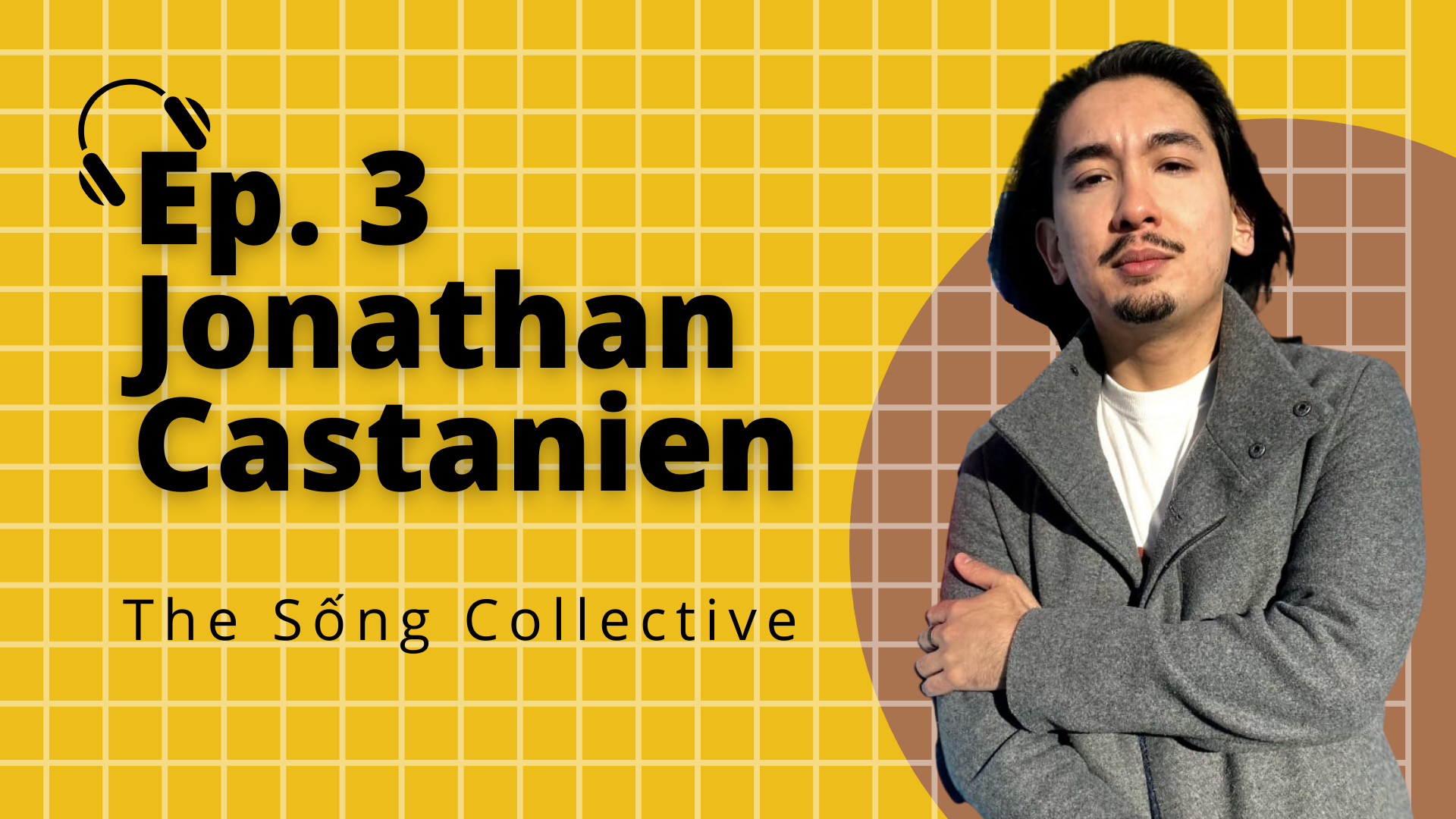
Welcome Jonathan.
Jonathan Castanien: Hi. It's so good to talk to you.
Yura Sapi: Yeah! So great to talk to you. We'd love to hear more about what your origin story for The Sống Collective is about.
Jonathan: So in 2018, David approached me and Carolina with this idea. I think how it started actually was, we're all Vietnamese artists, like you said. It's kind of rare, honestly, to find other Vietnamese theatre artists, just across the board. If you know the play Vietgone by Qui Nguyen. It's one of the only plays really written by a Vietnamese playwright, about Vietnamese people. It's not like trauma porn, war porn storytelling. It's true, and funny, and sexy, and honest. So we've been big fans of that play. Then around the time—this idea started—was when the sequel to that play, Poor Yellow Rednecks, was going to have its premiere in California. So they put out a call for photos from Vietnamese Americans, because I think they wanted to use actual photos of families in the projection design for the production.
It was like, hey, we should all submit our photos. They're looking for photos. Then we started talking about the play, and what it means to us. I think David just sort of put the idea out there. He's like, what if we did a reading of Vietgone, and somehow used it to bring attention to the current refugee crisis happening? There was a lot of discussion, and a lot of attention being brought to the Syrian refugee crisis, and the United States did not have a solid response to it. It was frankly something that we were not happy about. So he put it out there, and I was like, yeah, and Carolina immediately also said, yeah. Originally, it was just going to be like this reading event that we would do. We would pick a nonprofit to raise funds for through donations from the audience.
And that would be it, but then as we were meeting... Someone floated the idea of what if we were just like our own thing? What if we did it as a collective. David pitched the idea of The Sống Collective. I'm sorry to anyone who's Vietnamese listening to the podcast. My pronunciation's not great, but sống means to live. So that was, I think something that was meaningful to us as a name. It kind of represents our families who were refugees themselves, and their battle to live, and to survive, to continue life. Even when something as hard as losing your own country could happen.
[music]
Yura Sapi: Chapter seven, asking for resources in community and just exchange.
So, at the start of the pandemic, I participated in an online guided discussion at metaDEN—A healing incubator for and by Queer, Trans, Black, Indigenous, and other people of color. The session was on just exchange. Led by artists and activists, Jonathan Gonzalez. I really appreciated this framework as someone who is, one, frequently living and working in different money currencies, and across borders.
And two, as someone who wants to move away from exchanging through solely money and government currencies. One thing I missed about in-person artisan markets was getting to trade and exchange with the other artists, and in a way that is just—right? So, you don't trade unless you require or desire the item, service or need, and you exchange at a fair point. What I'm giving is fair to what you are receiving, and vice versa. It was also super interesting for me to be at the session at metaDEN as someone living in Latin America. Being able to join in through video, because a lot of the resources folks from New York, and from the US were sharing and offering were talking about systems that were created in Latin American countries—and African countries.
So it was especially interesting thinking about Venezuela, and how the money system is super intense right now, in terms of just so much going on. You know, US dollar bills being sold at higher amounts based on the newness, the crispness of the bill. Treques being super common—“trades.” Being able to trade food, and also thinking about how food and other goods are valued differently based on how accessible they are in Venezuela right now.
Whether it's paying reparations, donating to an important cause, trading, I constantly think about just-exchange when producing work. When working outside of government currencies, the exchange of goods or services must be just, and must be fair, for us to be working outside of its systems of oppression.
Jonathan: So we had no money. We're also like three people who do not come from wealthy families. We're theatre artists who have to make it happen if we want it to happen, and figure out how we're going to pay the bills on our own.
Yura Sapi: A lot of theatre artists of color.
Jonathan: Right. For real though. That's the truth. We don't have that situation where our mom and dad can pay off our credit.
Yura Sapi: Or donate $10,000 to start off our company.
Jonathan: Right. So we were like, okay, how do we do this with zero money?
I think this also speaks to kind of how we are in general as three producers. We just leaned on our network, and our community. We asked for help, and it sort of fell into place, because we put the ask out. First off, we want an all Vietnamese cast, because we don't think that's ever really been done with this show. When we were reaching out to artists, we were very transparent. We chose the National Network for Immigrant and Refugee Rights. So we were like, it's benefiting them. We're unable to pay, but if you're willing to donate your time, we hope you can join us. So people were on board with that. Our director was our Arpita Mukherjee. She was phenomenal in this project, and really brought this approach that kind of was unconventional in terms of like readings.
Then how do we find space? Because that is probably the hardest thing in New York City when producing, is having space, and a venue that's not thousands of dollars to have for even one night. We just started emailing people we knew. We have connections—we've worked with a multitude of people in the city. We started doing our research and figuring it out. The thing that really helped us was finding this organization called ChaShaMa. They're really cool, honestly.
They're this organization that partners artists with property owners that have empty real estate in the city. So whenever you see like a vacant storefront they try to partner with these owners to provide free space for artists to either put on a show, or for visual artists to have a place to put their art. We were able to secure a space through them. It was an amazing reading. It was super electric people all night kept asking us what are we going to do next? We were like, we don't know. We weren't really thinking that far ahead. A huge benefit to us was our community to begin with. So, that kind of also pushed us to continue going.
Yura Sapi: Yeah, it's super connected to community. Both in how you were asking for resources and support to help it happen, and also in just the creation of the event. The fact that it's a fundraiser for another group. The fact that it's coming out of a desire with your team that wanted to work on this. It seems like people could sense that. I also had a thought while you were talking about how you were able to put out an ask to community, and community responded. The amount of resources we potentially have as a community of artists, art workers, theatre workers, of color, anti-racist folks. And that there is a potential for how much we could do to support each other if we had that system of communication, and system of being able to put out an ask, and have people respond. I had like a visualization of what that could be.
Jonathan: That's so true. I think there's so many things that kind of trick us, or don't want us to figure that out. I think in terms of a lot of way funding works, and even with theatres of color. While I was starting out my career it just felt like everyone's doing their own things, and there could be so much more potential if we came together, and did more co-productions, or do a network of theatres to put on festivals of new works.
We're so taught early on in our theatre careers and education that there is a scarcity, and that we got to fight for whatever we can get, and say yes to everything and all that, and I don't think that's right. We don't need to fight to have our voices heard. We can work together, and amplify each other even louder by working together. I think that night really showed me how people could really come together. Also, it showed me our audience was young people of color, people of multitudes of different identities, and not all theatre people. We had people we didn't even know, people who weren't in the “industry.” Really showed me the power of, you can draw in those audiences.
Yura Sapi: I think there's totally that myth, or narrative, that theatre is dying. We have to be still connected to older white patrons, because they are the ones that can pay, and they're the ones that enjoy it. Young people, people of color aren't interested. It doesn't speak to them, which I mean, that is part of it. That the theatre in the mainstream is not representing young people, and people of color, and other marginalized communities. So, proving that actually, when you do have these stories coming out, especially from teams that are producing it. That represent, who we are trying to represent, we are interested in going and supporting.
Jonathan: Yeah. Yeah. I roll my eyes at when people are like, theatre's dying. I'm like, no. I mean like maybe theatre as we know it is dying, and maybe that's a good thing.
Yura Sapi: [said in unison] That’s a good thing.
[laughter]
Jonathan: I'm a stage manager. I'm not always on the creative side, or have a creative input typically in my main revenue stream, my main practice, but I know, just as a person who views theatre, I have very little interest in living room dramas filled with just white people.
[music]
Yura Sapi: Chapter eight. Power sharing, and unanimous decision-making.
Jonathan: In terms of like The Sống Collective, we're really lucky that three of us don't really have much of an ego, in terms of the work we're doing. We all three really value and want to put community first. We're not in it to do plays as our creative outlets. It's not for us. It's not to have like a play that Carolina can star in, or that David can star in, or that I can stage manage. We really try to focus on that aspect the most in anything we approach. How is this benefiting the artists? How can we help the artists grow? How is this important for audiences? And that's really where we start. Anytime we meet with someone about a potential project, the first things we ask are, "What are your dreams? How do you imagine this going? What do you need the most out of this process?"
That's been really a big help to us in what we do. While we have different backgrounds and experiences, in terms of theatre. David has a lot of classical background, Shakespeare, and all that. Carolina has done a lot of downtown work in New York. She went to school here in Brooklyn for her undergrad. I have some good experience in regional theatre. The inner workings of regional theatre, don’t necessarily recommend it [laughter], and new works. A lot of my stage managing has been around new play, and new play development, new musical. So we bring all that to the table, but at the same time we seem to have very similar artistic tastes too. Where we can agree on things pretty easily. We tend to have the same desires and wants in storytelling. We also agreed early on that between the three of us, it wasn't like a majority rule.
We had to be unanimous in our decision, which has been helpful because maybe if one of us isn't so hot on it, or unsure about a project. It helps us go into deeper conversations about the work we want to do and why it's a good fit for us. Why it matches our mission, why we think it needs to be done. That's kind of our main guiding principles, in terms of like what we take on or not. Again, with community, almost all our projects have kind of had the start in someone coming to us, and being like, "I want to do this. Can you help?" And we're like, "Yeah, let's do it." So it really, again, goes back to serving our community. People are coming to us asking for support, and we're able to provide it where we can.
Yura Sapi: Would you say that you're actively working against hierarchy?
Jonathan: Yeah. I mean, I like to hope that we are, because it's hard sometimes because we're so steeped in it. Our training is all swimming in it. So it's also a lot of shedding and unlearning of bad practices, White supremacy, and all the systemic oppression that are built into our industry.
Yura Sapi: And actively told that this is the way that it is done. It needs to be done.
Jonathan: Right.
Yura Sapi: You must have an artistic director, and someone at the top with potentially managers, and then people who work under managers. This idea of that. That is the way that it works.
Jonathan: Right.
Yura Sapi: In textbooks, you know?
Jonathan: Oh my god. Yeah. I know. I think it's funny, because we all just call ourselves co-founders, and we kind of... A few weeks ago, one of us was like, "Should we have titles? Just because it says we're co-founders, it doesn't show that we're currently actively part of the organization," and we're all like, "Oh, I guess so," we're like, "What should it be?" There was so little interest in determining titles. Whenever we do a project, the three of us just do it. No one has a given role in terms of making it happen. Carolina has experience with casting, because she's done some work with casting offices in the city. She usually gravitates towards organizing the casting aspect. Maybe I'll handle some of the email communications to our lists. We're just doing what we're strongest at. There's no toxic ownership about what we do.
Then if we can't do it, we're like, "Hey, this needs to get done. Can someone else handle this right now? I'm a little too busy," or like, "I have too much on my plate." We also monitor each other of like, "Oh, that seems like you're taking on a lot. Maybe you should give someone else that thing that needs to get done on the list." There's no main person. A lot of times we'll even sign our email with all three of our names from our Sống Collective email. It's three of us. There's no one leader. I think that's been a benefit to us.
The way theatre's been... The model of theatre, there's an artistic director, and they sit in these positions for decades. I don't think that's helpful to storytelling, or how we create art. Even with us, we love what we're doing right now. I mean, we've only been doing it for like a year and a half now, but from the get-go we're doing this, but we don't want to be the leaders of this forever. We want to imagine a world where we pass it on to other people, to like another generation of theatre artists who want to carry the mission on. We don't want to be running this theatre collective into our fifties, because we also don't think that's in the best interest of this organization, whatever it continues to evolve into.
[music]
Yura Sapi: Chapter nine. Abundance over scarcity. Part one.
[music fades out]
Before we were naming scarcity, and I was thinking about how promoting scarcity thinking upholds the broken systems. I think it does uphold hierarchy as well. This idea that there's a limited amount of resources, and we need to utilize hierarchy to be able to get these resources. Instead of another group or another person who gets them. And a lot of other aspects of these broken systems. A fear of open conflict, which I think comes with hierarchy too. This idea of not being able to disagree. Then in that way too, having like it’s either or, right or wrong, it's one way or another, you're with us or you're not—without having that room for nuance.
Jonathan: Yes, to all that. It like flashes me back to times I've worked in regional theatres, and these large non-profits. The thing too that's really shitty about these organizations is that it really does pit us against each other, because you know, they only have enough slots in their season for whatever. For like an Asian play, or a Black play, or a Latinx play. They pit us against each other in that way. Also, the amount of hypocrisy in these hierarchies, because the rules bend if you're famous. If it's a famous theatre artist the rules bend, and things change. Then scarcity maybe shifts to something else, resources shift to something else just because there's a name attached. I don't believe in that. I really don't want to subscribe to that.
We want to make artists feel fully supported. We also want to pinpoint artists who are the ones not being supported by these structures. Say you send us a play, we're like, "Oh, it's not solid yet, but like there's potential." We see that, how can we help it grow? Really avoiding subscribing to the idea of you went to a name school like Yale or something, or you've had a production before. We really want to make sure people who have a harder time getting these resources and opportunities have some place to go, or some place to look to.
[music]
Yura Sapi: What would be a final tip you would give to any listener who maybe is thinking about starting their own collective, or has an idea, or maybe one day will have an idea?
Jonathan: Ooh, I'm a planner. I like things laid out, and knowing what's going to happen. I think if you have an idea, or you have this desire to make a project happen, or start your own theatre collective, take the leap. Know that it'll be imperfect at times, and that there are people willing to support you in your work if you just ask. Show the need, there will be people to help you. I know for myself, a resource that has been really helpful for me is The Consortium of Asian American Theatres and Artists across the country. I mean, that's where I met David, and that's how I've built a lot of my network in New York.
[music]
Yura Sapi: What's next for you, what's next for The Sống Collective?
Jonathan: Yeah. You know, that's a good question at this time. Whatever happens, happens. There's nothing like super lined up for me personally. For The Sống Collective, right now we're trying to set the foundation for all strenuous things that come with an organization, like our website, and finances, and all that. Just to make sure we have that bedrock set, so we can actually do the things we want to do more fully. We have a few projects we're slowly in talks with, with other organizations.
There's a lot of talk amongst Carolina, David, and I. We're doing a project focused on addressing anti-Blackness in the Asian-American community. That is something we're piecing together, and trying to see where it leads us. When I was trying to figure out more developmental ideas for Vietnamese writers, because we've been looking far and wide for Vietnamese American playwrights, or just Vietnamese playwrights in general. It is not easy. It is harder. I think we want to address why that is, and how we can shift that with gatherings at a limit. We have to be nimble and figure out what sort of digital programming can we do, and what is worthy of audiences, and to share with our community? Because I think a lot of us are getting burnt out on Zoom. What are the different ways we can present these stories in exciting, imaginative ways that are nourishing for folks rather than draining.
[music]
Yura Sapi: Thank you so much, Jonathan, for joining us. It was so great to have you.
Jonathan: Yeah. Thank you so much.
[music]
Yura Sapi: This has been another episode of the Building Our Own Tables podcast. I'm your host Yura Sapi. Thanks to Julian Vargas for original music used all throughout this podcast. You can find and follow them on SoundCloud. This podcast is produced as a contribution to HowlRound Theatre Commons. You can find more episodes of this series, and other HowlRound podcasts in our feed on iTunes, Google Podcasts, Spotify, and wherever you find podcasts. If you love this podcast and want to support future episodes, please donate at advancingartsforward.org. You can also post a rating and write a review on these platforms. This helps other people find us. You can also find a transcript for this episode, along with a lot of other progressive, and disruptive content on howlround.com. Have an idea for an exciting podcast, essay, or TV event, the theatre community needs to hear? Visit howlround.com to submit your ideas to the commons. Yupaychani. Thank you, until next time!

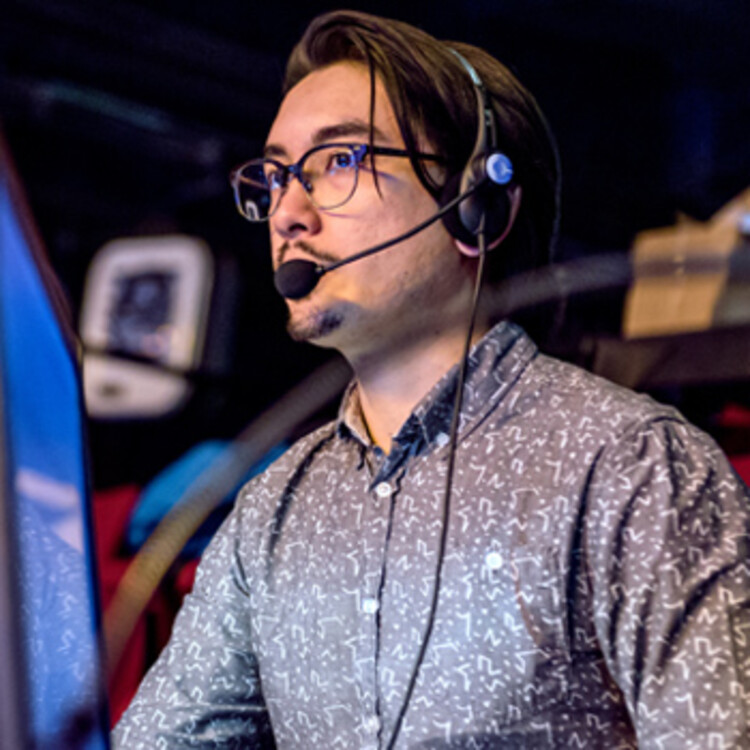
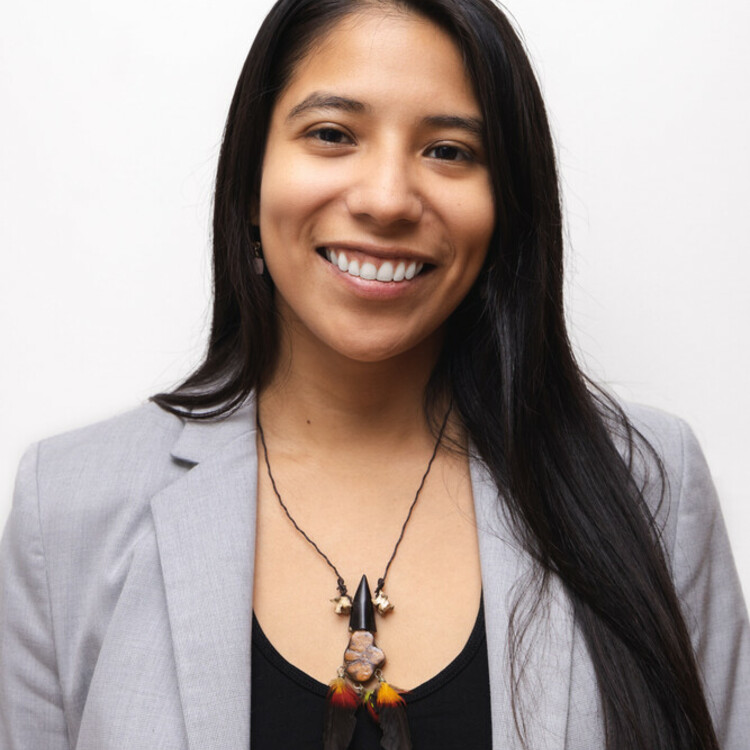
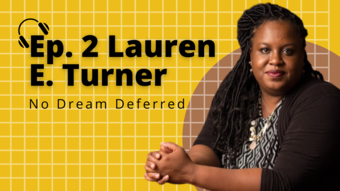


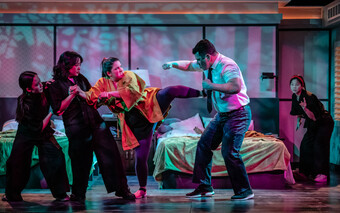



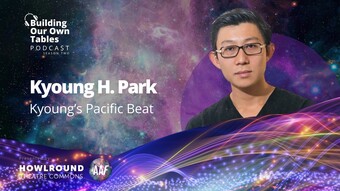
Comments
The article is just the start of the conversation—we want to know what you think about this subject, too! HowlRound is a space for knowledge-sharing, and we welcome spirited, thoughtful, and on-topic dialogue. Find our full comments policy here